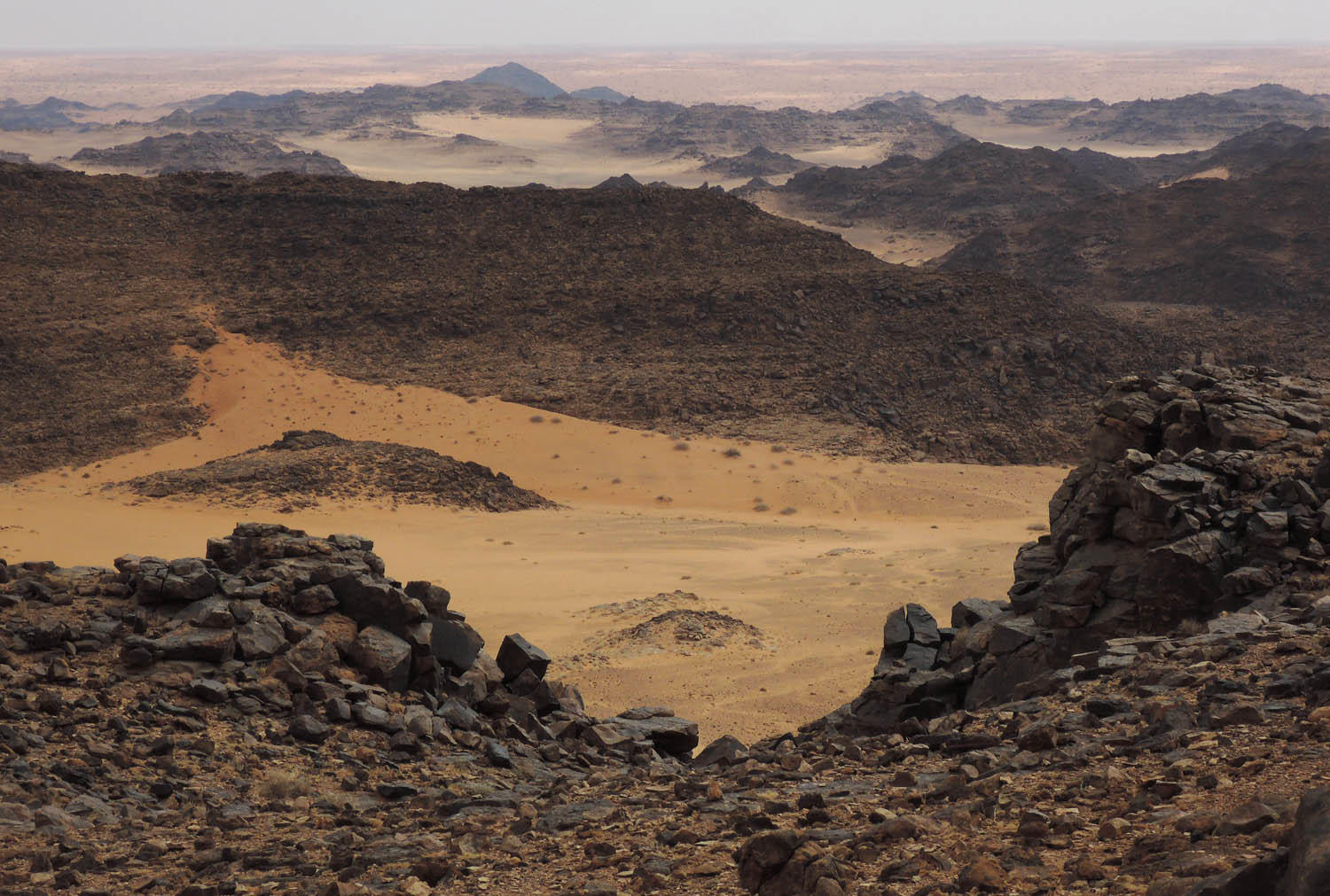
The landscape of Saudi Arabia where the engravings have been found. Credit: Olivier Barge, CNRS. CC-BY 4.0
A new study recently published in the journal PLOS ONE details the oldest known scale plans of man-made megastructures. These engravings, which are estimated to be between 7,000 and 8,000 years old, illustrate desert kites—enormous structures that were used for animal trapping. The ability to represent vast spaces on a small, two-dimensional surface signifies a significant leap in intellectual behavior, enriching our understanding of the conceptualization and construction of these kites.
Desert kites were first spotted by airplanes in the 1920s. They are sophisticated archaeological structures made up of walls up to 5km long which converge in an enclosure to trap animals bordered by pits. Such structures are visible as a whole only from the air, yet this calls for the representation of space in a way not seen at this time.
Rémy Crassard of CNRS, Université Lyon, and colleagues, report two engravings that represent kites in Jordan and Saudi Arabia. In Jordan, the Jibal al-Khasabiyeh area has eight kites. A stone with a representation carved with stone tools measuring 80 cm long and 32 cm wide was found nearby and dated to around 7,000 years ago. Zebel az-Zilliyat in Saudi Arabia has two pairs of visible kites 3.5km apart. Here a massive to-scale engraving measuring 382 cm long, 235 cm wide was excavated and the depiction was reportedly pecked rather than carved, possibly with hand picks. This was dated to around 8,000 years ago.
Plans like these would have been needed by the constructors as the whole layout is impossible to grasp without seeing it from the air. Until now, evidence for plans of large structures has been seen in rough representations, but these designs are extremely precise.
Although human constructions have modified natural spaces for millennia, few plans or maps predate the period of the literate civilizations of Mesopotamia and Ancient Egypt. These examples are the oldest known plans to scale in human history.
The authors add: “The oldest known plans to scale in human history are reported in our study. The engravings, dated between 8,000 and 9,000 years old, were discovered in Jordan and Saudi Arabia. They depict nearby desert kites that were humanmade mega structures used to trap wild animals. Although human constructions have modified natural spaces for millennia, few plans or maps predate the period of the literate civilizations of Mesopotamia and Ancient Egypt. The ability to transpose large space onto a small, two-dimensional surface represents a milestone in intelligent behavior. Such structures are visible as a whole only from the air, yet this calls for the representation of space in a way not seen at this time.”
Reference: “The oldest plans to scale of humanmade mega-structures” by Rémy Crassard, Wael Abu-Azizeh, Olivier Barge, Jacques Élie Brochier, Frank Preusser, Hamida Seba, Abd Errahmane Kiouche, Emmanuelle Régagnon, Juan Antonio Sánchez Priego, Thamer Almalki and Mohammad Tarawneh, 17 May 2023, PLOS ONE.
DOI: 10.1371/journal.pone.0277927
The South-Eastern Badia Archaeological Project (SEBAP; research at Jibal al-Khashabiyeh) is funded by grants from the French Ministry of Foreign Affairs, Al-Hussein Bin Talal University (project No. 164/2016) and the CNRS National Institute for Humanities and Social Sciences (WAA, MT). The GLOBALKITES project (research at Jebel az-Zilliyat) was funded by a French National Research Agency grant ANR-12-JSH3-0004-01 (RC). The Dumat al-Jandal archaeological project (research at Jebel az-Zilliyat) was funded by grants from the Saudi Heritage Commission, the French and Italian Ministries of Foreign Affairs, CNRS UMR-8167 Orient & Méditerranée, the University L’Orientale of Naples (Guillaume Charloux and Romolo Loreto). Graph modeling studies were funded by IXXI, Institut rhônalpin des systèmes complexes, Lyon, France (HS). Publication costs were funded by UMR 5133, Archéorient (RC). The funders had no role in study design, data collection and analysis, decision to publish, or preparation of the manuscript.
>>> Read full article>>>
Copyright for syndicated content belongs to the linked Source : SciTechDaily – https://scitechdaily.com/scientists-discover-oldest-scale-plans-of-mysterious-desert-mega-structures/